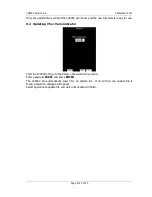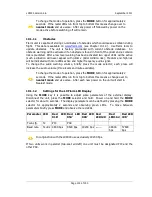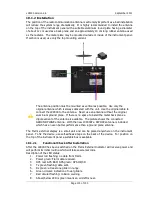
LX9000 Version 2.6
September 2011
Page 114 of 130
To change the mode of operation, press the
MODE
button for approximately 2
seconds. If the radial LEDs run from top to bottom this means change over to
nearest mode
and vice versa. After any power off followed by power on the
mode active before switching off will remain.
10.1.1.1
Obstacles
Flarm unit is capable of storing co-ordinates of obstacles which could cause a collision during
flight. This data is available on
www.flarm.com
(see Chapter 10.1.4). Use Flarm tools to
update obstacles. The unit is factory pre-loaded with current obstacle database. An
obstacle warning will be activated if an obstacle is found in front of the glider and a collision
risk is predicted. After a low level warning has been activated two upper LEDs will be active
(such a situation will never appear with glider v glider collision risk). Medium and high risk
will be indicated with more LEDs active and higher frequency audio signal.
To change the audio warning volume, briefly press the mode selector; each press will
increase the audio volume (three levels and mute available).
To change the mode of operation, press the
MODE
button for approximately 2
seconds. If the radial LEDs run from top to bottom this means a change over to
nearest mode
and vice versa. After each new power on the unit will start in
Nearest mode.
10.1.1.2
Settings for the LX Flarm LED Display
Using the
MODE
key it is possible to adjust some parameters of the external display.
Disconnect the unit, press the
MODE
selector and hold. Power on and hold the
MODE
selector for about 4 seconds. The display parameters can be defined by pressing the
MODE
selector for approximately 2 seconds and observing green LEDs. To move between
parameters briefly press
MODE
and observe the red LEDs.
Parameter LED
Red LED
018˚
Red LED
054˚
Red LED
090˚
Red
LED126˚
Red
LED162
˚
Red LED
198˚
Twin cfg.
Tx
PIC
PAX
Baud rate
Tx+Rx 4800 bps
9600 bps
19200 bps -------
38400
bps
57600
bps
In conjunction with the LX9000 use exclusively 19200 bps.
If two units work in parallel (two-seat aircraft) one unit must be designated PIC and the
other PAX.














































